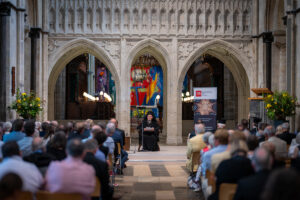Ft. Lauderdale, FL – The Orthodox Christian Network (OCN) reports on ‘Persecution of Christians: What You Should Know’ by Suzy Hanna. OCN is an official agency of the Assembly of Canonical Orthodox Bishops of the United States of America, whose mission is to strengthen Orthodox Christian communities and to share the timeless faith of Orthodoxy with the contemporary world by using modern media: radio, the Internet, podcasts, DVDs, television and more.
Persecution of Christians: What You Should Know
by Suzy Hanna
Read this article on the web site of myocn.net »
The systematic persecution of Christians in Iraq is indicative of the persecution of Christians in the Middle East; cruel and barbaric. Like many minorities, these Indigenous inhabitants of Iraq have suffered under various regimes; however, the situation worsened in the last few weeks when the militant extremists ISIS (or DAESH as per their Arabic acronym) started a genocide, “cleansing” the Christians from Iraq, in order to establish an Islamic Caliphate State.
ISIS had been fighting in Syria, but having been somewhat contained by Syrian President Bashar Al Assad, they moved on to Iraq, which, due to its vulnerability, was an easy target to attack. Iraq had its political system and army systematically broken since the removal of dictator Saddam Hussein and the resulting political vacuum that ensued. Due to the breakdown in Iraq, it did not take ISIS long to capture several cities and key landmarks such as dams and oil fields.
Christians have suffered unspeakable atrocities specifically over the last few weeks under ISIS. Christian homes were graffitied with the Arabic letter for N (Noon), to identify the so-called ‘Nazarenes’ (a semi-derogatory term for Christian.) The houses and shops which were identified became targets for looting, and the people inside were to be killed. Christians were threatened with death; images of public beheadings and crucifixions of Christians became rampant. Graphic images have become the norm. Killers proudly pose holding decapitated heads, smiling into the camera, while several heads are lodged onto poles in the background. A recent photograph shows a man looking confused holding the body of a 4 or 5-year-old girl wearing a pretty dress- with no head. A man breaking down in the background seems to be in less shock than the probable father of the girl, who does not seem to comprehend the situation- he is holding his daughter’s mutilated body. Women are raped and/or killed. Mass graves of decapitated men with their heads lying on or near their stomachs are regularly shared on Facebook pages. One of the most notorious stories that has embodied the atrocities in Iraq is the story of an Iraqi father who committed suicide after he was forced to watch his wife and daughter being raped by ISIS.
These are someone’s children. Someone’s father, son, brother. Someone’s daughter, mother, sister…
One of the most heart-wrenching facts is that Mosul, Iraq’s second largest city, is emptied of Christians. Think of the second largest city in your country. Now imagine it being emptied of Christians.
Christians who were ‘lucky’ in not being beheaded walked away from the city empty handed, prohibited by ISIS from taking any of their possessions with them. A heart-wrenching interview with Syrian Orthodox Archbishop Nikodemos Dauod, head of the Diocese of Mosul, Iraq and Kurdistan region, showed a passionate and frustrated despair, felt by Christians around the world who watched the tragic interview. His Grace talked about a baby girl having her gold earrings- no more than a few grams of gold- being confiscated off her. Christians were sent away with literally nothing. Church bells were silenced and crosses were taken down, replaced with Islamic flags. For the first time in its history, the city was empty of Christians in preparation for the Islamic state to come.
ISIS also went on to destroy Christian places of historical worship, such as the tomb of the prophet Jonah.
But as we know, “All things work for the good for those who love God.” (Romans 8:28.) Christians around the world have congregated as one in prayer, knowing that as the members of one body, when one member hurts, all hurt. Some churches have consecrated fasts for the Iraqi Christians.
Simultaneous to Prayer and fasting, several appeals have been set up by various churches and church groups, particularly Assyrian Orthodox Churches. There have been several demonstrations of solidarity in major cities around the world to show our brothers and sisters in Iraq that they are not forgotten. Several petitions are circulating, encouraging Western countries to offer asylum and humanitarian aid to the Christians in Iraq. We encourage people to write to their MPs or legislative representatives doing the same. Many people have also changed their Facebook and Twitter pictures to what resembles a one-eyed smiley face – the Arabic letter N (noon) in an effort to highlight the plight of the Iraqi Christians and to show solidarity.
There is plenty to be done, so please volunteer your time and prayer in an attempt to alleviate the suffering of our Iraqi Christian brothers and sisters.







